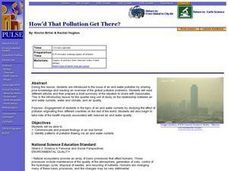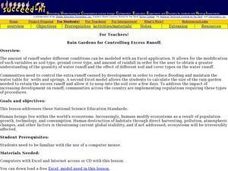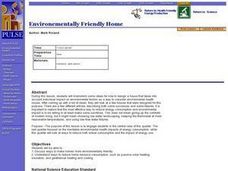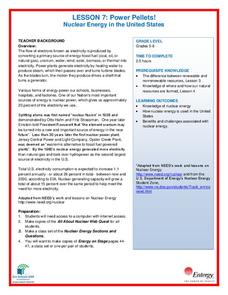Curated OER
Environment: How'd That Pollution Get There?
Pupils examine how global wind and water patterns aid in the spread of worldwide pollution. In groups, they read articles about the domino effect of pollution and create posters displaying its journey. On blank world maps, students...
NOAA
Seafood and Human Health
Whether your young biologists realize it or not, humans play a significant role in marine ecosystems. To help them understand this fact children first create graphical representations that show homo sapiens' place in marine food chains,...
Beyond Benign
Ecological Footprint
How does your lifestyle measure up in terms of your ecological footprint? Young ecologists examine their impact on the planet using an insightful online calculator. A short quiz asks users to rank the size of their homes, their energy...
Michigan Sea Grant
Wetlands
Wetlands may not sound particularly ornate, but they are as important as any habitat! With a hands-on activity, young scientists build a wetland model and observe its many functions in action. They discover the importance of wetlands to...
Curated OER
Rain Gardens for Controlling Excess Runoff
Students address the idea that human beings live within the world' ecosystems. They discuss how humans modify ecosystems as a result of population growth, technology, and consumption. Students discuss how the human destruction of...
Redefining Progress
Have and Have-Not
Is there a correlation between a country's wealth and the extent of its ecological footprint? What exactly constitutes an ecological footprint, and how does one country stack up against the rest? This is a unique lesson to incorporate...
Curated OER
Message in the Bottles
Students identify the three realms of the Arctic Ocean, and describe the relationships among these realms. They explain the relationships between gross primary productivity, net primary productivity, and respiration.
Curated OER
Mississippi’s Electricity: From Generation to Consumption
Eighth graders discover how electricity is produced. In this physics lesson plan, 8th graders infer about the future of Mississippi's energy industry. They participate in a Smart Board interactive activity at the end of the lesson plan.
Curated OER
Environmentally Friendly Home
High schoolers discuss ways to make homes more environmentally friendly. They comprehend ways to reduce home resource consumption, such as passive solar heating, insulation, and geothermal heating and cooling
Curated OER
Don't Use it All Up
Students observe the way that a sponge absorbs liquids and discuss how we our use of natural resources affects the environment around us. They discuss the need to conserve resources so we don't run out of what we need.
Curated OER
Sustainable Development and Canada's Natural Resources
Students use text information, data and graphs to explain what sustainable development is, and to investigate the rate of consumption of Canada's natural resources. In groups, they graph their findings.
Curated OER
Save the Earth: It's Everyone's Home!
Students research ways to conserve and reduce energy and resources. In this reducing waste lesson, students work in teams to experiment with water and losing resources. students brainstorm about ways to conserve and reduce energy and...
Curated OER
The State of the Planet
Learners address four different environmental topics (water issues, the threat of food shortages, human population growth, and global warming) as they watch a film and discuss the future of the earth. In groups, they complete various...
Curated OER
Sustainable Livestock
Students investigate healthy eating habits by researching livestock. In this food sustainability instructional activity, students research the negative impact factory farming has on our environment due to pollution. Students define...
Consortium for Ocean Science Exploration and Engagement (COSEE)
Carbon Dioxide & Krill: Impacts
What effects do temperature and carbon dioxide levels have on the zooplankton of Antarctica? This concluding lesson plan in a short unit on climate change and the ocean helps environmental scientists answer these questions. After...
PricewaterhouseCoopers
Waste and Recycling: Recycling and Energy Recovery
Reduce, reuse, recycle, and recover. Young environmentalists learn about the overwhelming amount of garbage produced and discover better ways to minimize their impact on Earth by learning the difference between garbage and recyclables.
PricewaterhouseCoopers
Waste and Recycling: Recycling Paper
We take paper for granted, while thousands of trees are being made into the paper we toss in the trash. Start a dialogue about paper reduction and recycling in class, and share the negative effects paper production has on our ecosystem....
National Wildlife Federation
Power Pellets! Nuclear Energy in the United States
Nuclear power provides about 20 percent of the energy generated in the United States. The seventh activity in the series of 12 tackles nuclear power. After sharing what they know about nuclear energy, scholars complete a WebQuest make a...
Curated OER
Exploring Electricity - Four Activities
These are four classic activities used for instructing upper elementary electricians. The first involves experimenting with the Van de Graaff generator. The second is a series of hands-on experiences with static. In the third activity,...
Nuffield Foundation
Measuring Respiratory Quotient
How do scientists prove tiny living things respire? Young scientists build a respirometer and measure respiration rates in living creatures. By comparing the measurements of both plants and animals, they understand the similarities.
Curated OER
Make a Sundial
Students explore space science by conducting a sun experiment in class. In this time telling instructional activity, students discuss how the sun sits in our sky at exact times each day and how astronomy is based on our perspective of...
Curated OER
Boating Safety
Young scholars are introduced to the safety procedures to follow while boating. After taking a quiz, they complete open-ended questions about boating accidents in Illinois. They discuss as a class how those accidents could have been...
Curated OER
Intermediate Activity: Energy Guide Labels
Young scholars explore energy efficient appliances. In this economics and ecology lesson, students compare and analyze EnergyGuide labels of various appliances. Young scholars discuss federal government involvement with consumer...
Curated OER
Zoo Poo
Students use Internet research to determine the amount of carbon dioxide produced per unit energy for biomass and coal. In this alternative energy lesson, students research to find out how much energy and carbon dioxide several coal and...

























